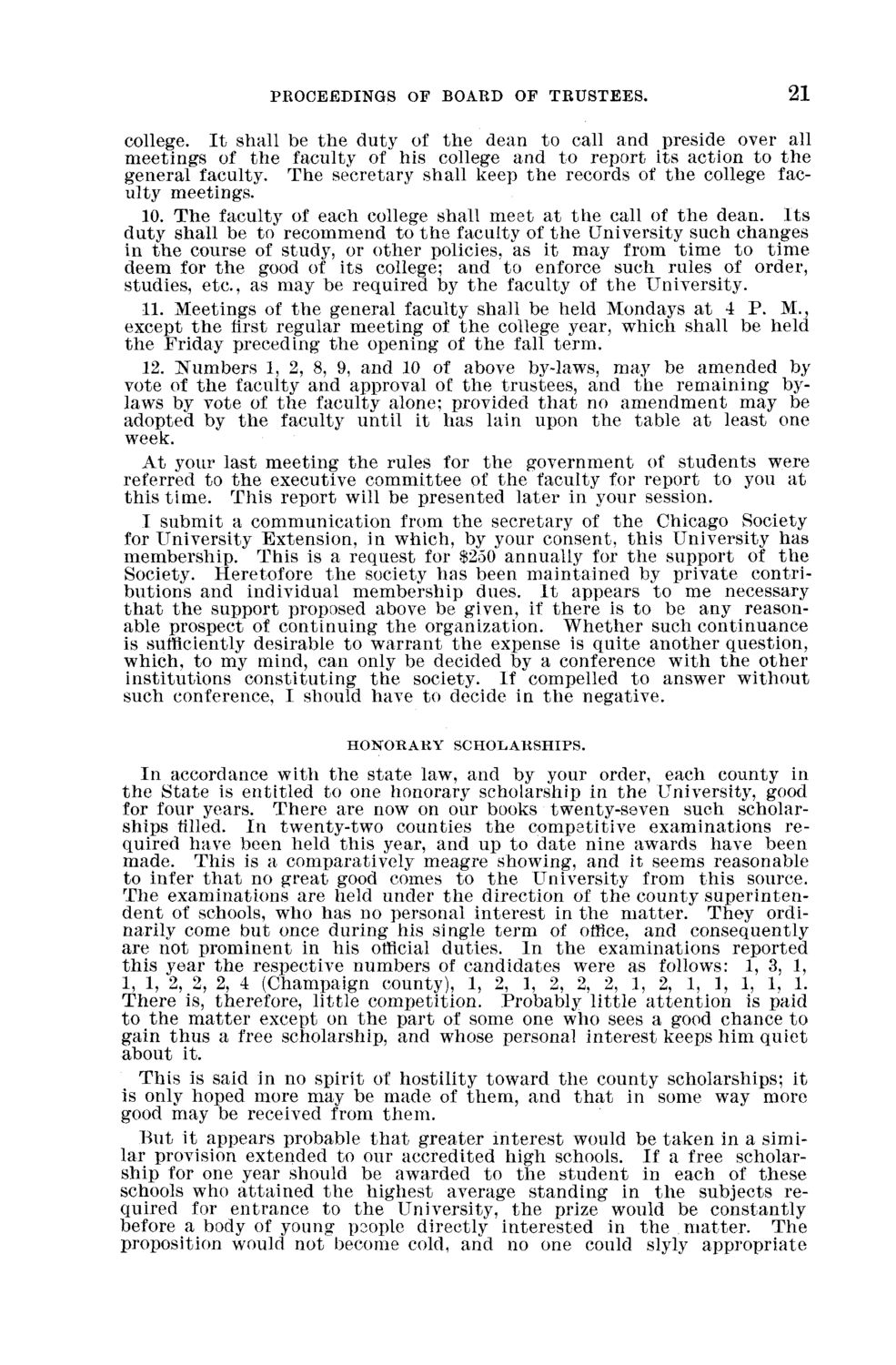| |
| |
Caption: Board of Trustees Minutes - 1894
This is a reduced-resolution page image for fast online browsing.

EXTRACTED TEXT FROM PAGE:
PROCEEDINGS OF BOARD OF TRUSTEES. 21 college. I t shall be the duty of the dean to call and preside over all meetings of t h e faculty of his college and to report its action to t h e general faculty. The secretary shall keep the records of the college faculty meetings. 10. The faculty of each college shall meet at the call of t h e dean. I t s duty shall be to recommend to t h e faculty of t h e University such changes in the course of study, or other policies, as it may from time to time deem for the good of its college; and to enforce such rules of order, studies, etc., as may be required by the faculty of the University. 11. Meetings of the general faculty shall be held Mondays at 4 P. M., except t h e first regular meeting of t h e college year, which shall be held the Friday preceding the opening of the fall term. 12. Numbers 1, 2, 8, 9, and 10 of above by-laws, may be amended by vote of the faculty and approval of the trustees, and the remaining bylaws by vote of the faculty alone; provided t h a t no amendment may be adopted by the faculty until it has lain upon the table at least one week. At your last meeting the rules for the government of students were referred to the executive committee of the faculty for report to you at this time. This report will be presented later in your session. I submit a communication from the secretary of the Chicago Society for University Extension, in which, by your consent, this University has membership. This is a request for $250 annually for the support of t h e Society. Heretofore the society has been maintained by private contributions and individual membership dues. I t appears to me necessary t h a t the support proposed above be given, if there is to be any reasonable prospect of continuing the organization. Whether such continuance is sufficiently desirable to warrant the expense is quite another question, which, to my mind, can only be decided by a conference with the other institutions constituting the society. If compelled to answer without such conference, I should have to decide in the negative. HONORARY SCHOLARSHIPS. In accordance with the state law, and by your order, each county in the State is entitled to one honorary scholarship in the University, good for four years. There are now on our books twenty-seven such scholarships rilled. In twenty-two counties the competitive examinations required have been held this year, and up to date nine awards have been made. This is a comparatively meagre showing, and it seems reasonable to infer t h a t no great good comes to t h e University from this source. The examinations are held under t h e direction of the county superintendent of schools, who has no personal interest in the matter. They ordinarily come but once during his single term of office, and consequently are not prominent in his official duties. In the examinations reported this year the respective numbers of candidates were as follows: 1, 3, 1, 1, 1, 2, 2, 2, 4 (Champaign county), 1, 2, 1, 2, 2, 2, 1, 2, 1, J, 1, 1, 1. There is, therefore, little competition. Probably little attention is paid to the matter except on the part of some one who sees a good chance to gain thus a free scholarship, and whose personal interest keeps him quiet about it. This is said in no spirit of hostility toward the county scholarships; it is only hoped more may be made of them, and t h a t in some way more good may be received from them. But it appears probable t h a t greater interest would be taken in a similar provision extended to our accredited high schools. If a free scholarship for one year should be awarded to the student in each of these schools who attained the highest average standing in the subjects required for entrance to the University, the prize would be constantly before a body of young p3ople directly interested in the matter. The proposition would not become cold, and no one could slyly appropriate
| |